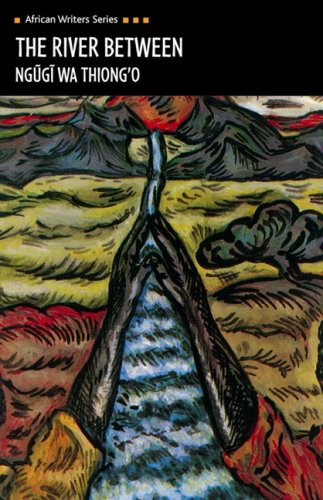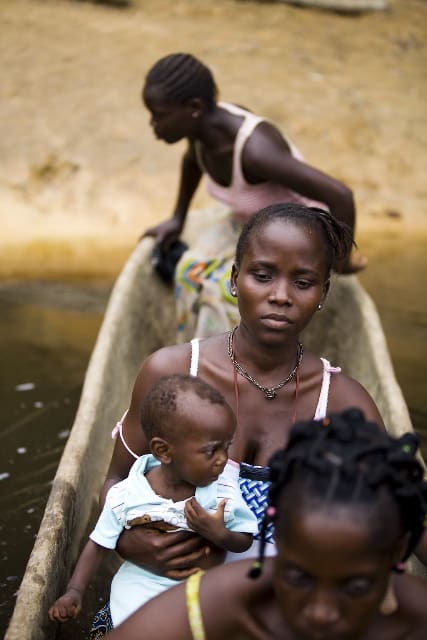Set in the time of the Mau Mau uprising, Ngugi wa Thiango’s novel, “The River Between” tells a harrowing story of the clash between two villages in the Gikuyu region over the maintenance of the traditional Gikuyu belief systems vs. the integration of Christianity by colonial white settlers.
It tells of one man (Waiyaki)’s struggle to unite these villages amongst the chaos and restore the dignity of his beloved tribe.
By telling the story through a series of related events, Thiong’o effectively illustrates the division and chaos that the introduction of Christianity brought to the people of Gikuyu during the colonial period.
Thiang’o’s novel focuses on the struggle between two towns named Makuyu and Kameno Prior to the colonization of the white settlers, both ridges lived in peace and were united by their common belief systems.
However, the arrival of Christian missionaries caused a separation between the two. In the novel, Makuyu represents the stronghold for Christian integration due to the fact that Joshua (who was converted by Livingston at the Siriana Mission School established by the colonials) and his followers live there and constantly preach about God.
In the context of the novel, Joshua epitomizes the Christian belief system in that he is unwavering and uncompromising about his faith. In addition to this, he preaches outspokenly and vehemently against the ways of the tribe. He is the most extreme out of all the converts in that he abandoned all practices related to the tribe, making no secret of his abhorrence against them.
His own name is representative of this hatred as the name “Joshua” is a biblical name that he most likely adopted. In contrast, Kameno is considered the stronghold for the traditional Gikuyu beliefs and Chege, (Waiyaki’s father), is the representation of Gikuyu tradition. “Makuyu was now home of the Christians while Kameno remained the home of all that was beautiful in the tribe. Who would ever bring it together?” (54).
After hearing of Muthoni’s death, Chege contemplates about the fate of the Gikuyu people. Though he is calmer and not as radical as Joshua, Chege is still just as passionate about the Gikuyu beliefs. In this way, both men parallel each other and represent two sides of the conflict.
Of the many traditional rituals in precolonial Africa, circumcision was one of the most important rituals of all. It was a rite of passage that held so much importance, those who did not partake in the ritual were looked down upon in the Gikuyu society.
The tradition of circumcision is a central and important part of the plot of the novel as a whole because it was this single ritual that sparked conflict between the Christians brought up in the Siriana school and those who followed traditional Gikuyu beliefs. “Circumcision was an important ritual in the tribe. It kept people together, bound the tribe. It was the core of the social structure, and a something that gave meaning to a man’s life.
End the custom and the spiritual basis of the tribe’s cohesion and integration would be no more.” (Thiang’o 68). Because circumcision was an age old tradition that brought unity to the tribe, the threat that the colonial Christians and their followers posed for exterminating the practice caused the first wave of unrest and disagreement between the traditional keepers of Kameno and the followers of Joshua in Makuyu.
Circumcision was not only just a rite of passage, but it alone represented everything the Gikuyu people held dear to them. It was in a way, part of their identity. This is further demonstrated during Waiyaki’s own circumcision; “Blood trickled freely to the ground, sinking into the soil. Henceforth a religious bond linked Waiyaki to the earth….The son of Chege had proved himself” ( Thiang’o 45).
As Waiyaki goes through the motions of his own circumcision, a sense of victory overcomes Waikyaki’ as his initiation into manhood is complete. This strong emotional connection that the people of Gikuyu have with the ritual later clashes with the abhorrence that the Christians possess toward it. This hatred was so steep that it even caused rifts between friends and family.
Perhaps one of the most notable turning points in Thiang’O’s novel is the death of Joshua’s daughter, Muthoni. When she defied her straight-laced Christian father in order to get circumcised, (which resulted in her being disowned) she dies of complications from her wounds. Her death sparks calamity between the two towns and a disturbance that even touches Livingston in the Siriana Missionary School.
The cause and reason for her death becomes an important topic of debate amongst both Makuyu Christians and their Kameno rivals and ultimately pushes each group to cling more to their respective beliefs and defend them with vigor.
Through all of this, Joshua was the most vehement, of them all: “Joshua heard of the death of Muthoni without a sign of emotion on his face…Muthoni had been an outcast. Anything cursed here on earth would also be cursed in heaven. Let that be a warning to those who rebelled against their parents.” ( Thiang’o 53-54).
After hearing of his daughter’s death, Joshua’s beliefs are reaffirmed as he takes her death as punishment from God for rebelling against him. This encourages him to work even harder to push the Christian faith on the Gikuyu people.
Joshua’s apathy toward Muthoni’s death demonstrates how deep the rift had become between the traditional followers and Christian followers as it was strong enough to break family ties. Muthoni’s death is so significant that it even pushes Livingstone at Siriana to become more aggressive in his missionary tactics when he hears from one of the other missionaries that Muthoni was Joshua’s daughter.
This is noteworthy because Joshua is one of Livingstone’s most trusted and earnest converts. This realization ultimately leads to the Siriana Mission school restrictions: new policies that mandated all students of Siriana to renounce their traditional religions completely.
In contrast to the Christians’ reasoning behind Muthoni’s death, the people who favored the traditional Gikuyu religion saw Muthoni’s death as a punishment from Murungu, the god of the Gikuyu people, on Joshua for adopting Christianity; “This was a punishment to Joshua. It was also a punishment to the hills. It was a warning to all, to stick to the ways of the ridges.” (Thiang’o, 54.)
After hearing of Muthoni’s death, Chege concludes that this can only be a result of Joshua’s betrayal of the tribe. The contrast in the views that both groups possess regarding Muthoni’s death further deepens the division between the two groups.
Another element explored in the novel is the negative impact that the conflict had on the youth; Waiyaki and Nyambura (Muthoni’s sister) especially. Though Waiyaki is true to the Giyuku religion and Nyambura is a Christian, they are willing to go against their groups for the sake of their own happiness. “Oh [Waiyaki] I have always loved you.” (Thiang’o 137).
After finally mustering up the courage to speak up to her father, Nyambura leaves his house with Waiyaki and admits her love for him. The “star-crossed” lovers b-story highlights the strain that the conflict between tradition and colonialism put on the youth especially. The irony that exists in the fact that they are the children of Chege and Joshua, the extremes of their respected religious groups is also significant.
The youth in this novel represents the attempt to compromise between old traditions and Christian integration. This is exemplified in the fact that the youth were given a formal “white” education through Waiyaki’s school. This is idea is also exemplified in Muthoni’s rebellion against her father. “I too have embraced the white man’s faith.
However, it is beautiful, oh so beautiful to be initiated into womanhood.”(Thiang’o 26). Like Waiyaki and Nyambura attempted later in the book, Muthoni struggles to find a compromise between the beliefs of her Christian father and the Gikuyu traditions that she values. It should also be noted that all attempts by the youth in the novel to reach a common ground between the two religions failed.
For Muthoni, it ended in her death and for Waiyaki and Nyambura, their attempt at compromising resulted in them being shunned by the tribe. The fact that they all failed when trying to bring unity to the two belief systems is a telling that the depth of two towns’ hatred for the others’ beliefs.
Throughout history, religious conflicts have often brought calamity and disaster to many nations. From the Protestant and Catholic conflict in Europe to the Crusades. This division left no stone unturned as it went as far as to cause division in family ties. Like the Crusades and the Protestant Reformation, the introduction of Christianity in the Gikuyu region led to chaos among their own people.
This chaos, however, distracted them from the real threat: European colonial advancement. Though Waiyaki and Chege were correct about the importance of unifying the tribe to defend themselves against colonial oppression, the tribe was not able to see past their own personal conflicts to do so.
Thiang’o even goes as far as to imply that the introduction of Christianity to the Gikuyu region was just a front to mask the fact that the Europeans meant to take control of their land. “[Joshua] knew it was his duty as a Christian to obey the government, giving unto Caesar what is Caesar’s and to God the things that are God’s.” (24).
Joshua, being brought up in the Siriana Mission School, recites the famous biblical phrase with a deviated understanding of the meaning. Joshua, believing that it is his “Christian duty” to serve the colonial government is oblivious to the fact that he is being used by the Europeans to further their advances. These confilcts and distractions are ultimately what led to the civil unrest among the Gikuyu people.
Through the perspective of each character, the reader is able to fully understand the confusion and chaos that came with the colonization of Kenya. Thiang’o paints the ugly side of the conflict through the breaking of family ties and friendships. He uses these tragic events to convey his idea that, had the Gikuyu people been more aware of the growing white oppression, they might have been more unified and be able to defend their land.



What do you think about the death of muthoni? What it means on one hand…its says that it is a punishment to Joshua for disobeying the tribe and on the other it is a warning for every one to stick to Christianity